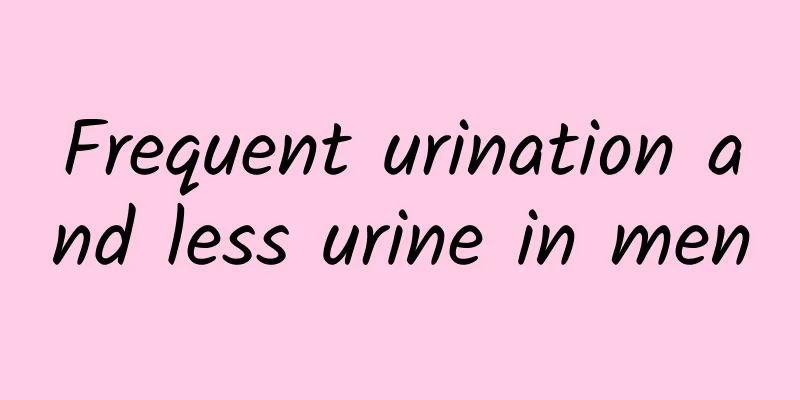Frequent urination and less urine in men

|
Many men have frequent urination and little urine. There are many reasons for this. It may be caused by cystitis, prostate hyperplasia, or physiological reasons such as drinking too much water. In the face of this situation, people need to pay special attention to understand the cause and take the right measures to treat it. Let's take a detailed introduction to why men urinate frequently and have little urine. reason: 1. Increased urine volume: Under physiological conditions, if you drink a lot of water, the amount of urine will increase, and the frequency of urination will also increase, resulting in frequent urination. Under pathological conditions, such as some patients with diabetes and diabetes insipidus who drink a lot of water, have a large amount of urine and urinate frequently. 2. Inflammatory stimulation: Acute cystitis, tuberculous cystitis, urethritis, pyelonephritis, vulvitis, etc. can all cause frequent urination. Under the stimulation of inflammation, frequent urination, urgency, and pain may occur at the same time, which is called urinary tract irritation. 3. Non-inflammatory irritation: such as urinary stones, foreign bodies, etc. 4. Reduced bladder capacity: such as bladder space-occupying lesions, pressure from an enlarged uterus during pregnancy, tuberculous bladder contractions, or larger bladder stones. 5. Psychoneural frequent urination. You need to go to the hospital for a detailed examination to find out the cause and carry out effective treatment. Different treatment methods are selected according to the different causes of frequent urination. It is recommended that you go to the hospital for an examination. Treatment: 1. Middle-aged and elderly men with frequent urination, increased nocturia, difficulty urinating, dribbling urine, thin urine stream, prolonged urination time, etc. may be suspected of prostate hyperplasia. See a urologist promptly. 2. If patients have increased drinking, eating, and urinating, accompanied by weight loss, etc., consider the possibility of diabetes. See an endocrinologist immediately. 3. If you have frequent urination, accompanied by urinary tract irritation symptoms such as urgency and pain, or fever, consider the possibility of urinary tract infection and see a nephrologist promptly. 4. If the patient has persistent thirst, polydipsia, polyuria, frequent urination, dehydration, malaise, headache, weakness, etc., consider the possibility of diabetes insipidus. See an endocrinologist immediately. 5. Continuous or repeated frequent urination with small urine volume each time and no urgency or pain during urination may indicate hysteria or neurogenic bladder. See a neurology or psychiatric doctor immediately. 6. Other severe, persistent or progressive symptoms or signs occur. All of the above require prompt medical consultation. The doctor may recommend blood routine, urine routine, prostatic fluid, urodynamics, immune function, X-ray, B-ultrasound, cystoscopy, urodynamics and other tests to confirm the diagnosis. Drugs with better therapeutic effects: One is oral medication, and the other is topical medication. Oral medications for frequent urination are mainly some antifungal, antibacterial and anti-inflammatory drugs. For example, enteric-soluble aspirin tablets and valacyclovir tablets in Western medicine. These two drugs can quickly penetrate into the urinary system, kill bacteria, and control frequent urination. However, since enteric-soluble aspirin tablets and valacyclovir tablets are Western medicines belonging to the antibiotic class, they have certain side effects and cannot be used for pregnant women, the elderly, and infants. The second type is some topical medications, such as potassium permanganate topical tablets, female suppositories, vaginal suppositories, etc. Supplements are suitable for patients who are in a special period of physical condition and cannot be treated with medication. For example, children, the elderly, and pregnant women with frequent urination can use suppositories and vaginal suppositories for treatment. Because it is sterilized from the outside, the side effects are relatively small. |
<<: Legs go limp after ejaculation
>>: There is white discharge in boys' underwear
Recommend
Where does the sperm go if the vas deferens is blocked?
There are many reasons why a couple cannot have c...
How to tell if a man is a virgin
Boys who have never had sex are called virgins. N...
How to treat severe premature ejaculation?
Premature ejaculation is a common disease in men&...
Men's Health Hall: Eat a little ginger every day to become a man
Ginger contains volatile gingerone and gingerol, ...
What causes sperm to clump?
Sperm is a very important component of childbeari...
The baby's health depends on the father's behavior
The latest research results from abroad show that...
Why do men's balls itch?
Men's genitals are very sensitive and often i...
What is the most effective way to treat glansitis?
Balanitis is a common disease in male urology, us...
The four major symptoms of kidney deficiency can be detected in 1 minute
A healthy kidney means a healthy body, especially...
What is the cause of the pain in the man's belly button?
Many people will experience pain in the umbilicus...
Acupuncture points and methods to improve male sexual function
Maybe many men are particularly concerned about t...
I never thought that after I quit smoking and drinking, my body would be like this?
Cigarettes contain about 1,200 chemicals, of whic...
Why does the glans penis smell fishy?
Patients with this type of glans penis odor shoul...
Swelling of the glans penis
Many men always see something unusual about their...
Why do men always ejaculate when sleeping?
Male friends should be very familiar with the ter...









